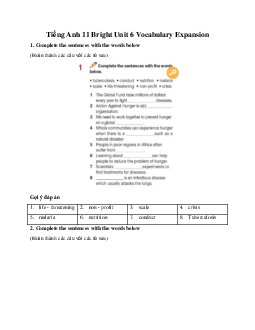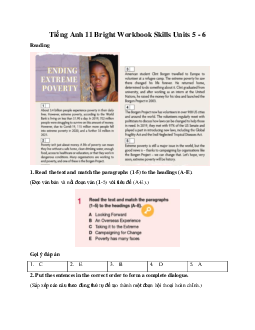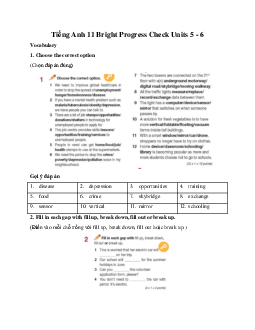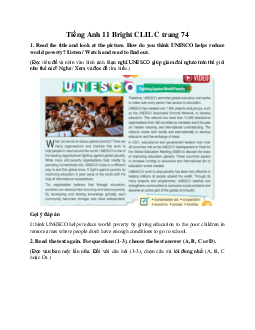






Preview text:
Tiếng Anh 11 Bright Unit 6 6a Reading
1. Look at the pictures, read the title and the first sentence in each text. What do
you think the texts are about? Listen / Watch and read to find out.
(Nhìn vào những bức tranh, đọc tiêu đề và câu đầu tiên của từng đoạn. Bạn nghĩ đoạn văn
sẽ nói về gì? Nghe/Xem để tìm hiểu.) Gợi ý đáp án
The texts are about organisations that help people in hunger and diseases.
2. Read the texts. Write A for (Action Against Hunger) and G for (the Global Fund). Which organisation ...
(Đọc văn bản. Viết A cho (Hành động Chống lại Nạn đói) và G cho (Quỹ Toàn cầu). Tổ chức nào...) Gợi ý đáp án 1. A 2. A 3. G 4. A 5. G
3. Read the texts again and answer the questions.
(Đọc các văn bản một lần nữa và trả lời các câu hỏi.) Gợi ý đáp án
1. Action Against Hunger conducts research to understand how we can predict and
prevent hunger on a global scale.
2. Approximately 26 million peole worldwide rely on Action Against Hunger.
3. Global fund raises money by uniting group leaders from around the world for donations.
4. The global fund has helped save more than 50 million lives. Vocabulary
Community social issues
4. Fill in each gap with depression, obesity, bullying, poverty, crime, healthcare,
pollution or gender inequality. Then listen and check.
(Điền vào mỗi khoảng trống với các từ depression, obesity, bullying, poverty, crime,
healthcare, pollution or gender inequality. Sau đó nghe và kiểm tra.) Gợi ý đáp án A. poverty B. obesity C. pollution D. depression E. gender F. bullying G. healthcare H. crime inequality
5. Read the statements (1-8). Which of the issues (A-H) in Exercise 4 does each statement match?
(Đọc các câu phát biểu (1-8). Mỗi vấn đề (A-H) trong Bài tập 4 phù hợp với vấn đề nào?) Gợi ý đáp án 1. D 2. C 3. F 4. G 5. H 6. E 7. A 8. B
6. Think Which of the social issues in Exercise 4 are the most serious in your
country. Tell your partner.
(Vấn đề xã hội nào trong Bài tập 4 là nghiêm trọng nhất ở nước bạn. Nói với bạn của bạn.) Gợi ý đáp án
In my opinion, pollution is the most serious problem in Viet Nam. Vietnam's water
resources and marine ecosystems are also facing severe pollution issues, affecting the
health and livelihoods of millions of people who rely on them. Water contamination from
industrial and agricultural activities, as well as plastic waste, are significant concerns.
Moreover, air pollution has reached alarming levels, causing respiratory problems, and
reducing the quality of life for people living in major cities.
(Theo tôi, ô nhiễm là vấn đề nghiêm trọng nhất ở Việt Nam. Nguồn nước và các hệ sinh
thái biển của Việt Nam cũng đang phải đối mặt với vấn đề ô nhiễm nghiêm trọng, ảnh
hưởng đến sức khỏe và sinh kế của hàng triệu người dân đang sống dựa vào chúng. Ô
nhiễm nước từ các hoạt động công nghiệp và nông nghiệp, cũng như rác thải nhựa, là
những mối quan tâm đáng kể. Hơn nữa, tình trạng ô nhiễm không khí đã đến mức báo
động, gây ra các bệnh về đường hô hấp, làm giảm chất lượng cuộc sống của người dân
sống tại các thành phố lớn.)
7. Collect information about an organisation either in Vietnam or in another
country that deals with one of the issues in Exercise 4. Make notes under the
headings name, goal of help and type of help. Prepare a poster for it.
(Thu thập thông tin về một tổ chức ở Việt Nam hoặc ở nước khác giải quyết một trong
các vấn đề ở Bài tập 4. Ghi chú dưới tiêu đề tên, mục tiêu trợ giúp và loại trợ giúp. Chuẩn
bị một tấm áp phích cho nó.) Gợi ý đáp án
- Heading name: Clean Up Vietnam
- Goal of Help: To create a cleaner and healthier environment in Vietnam by raising
awareness about the negative impacts of pollution and promoting sustainable practices. - Type of Help:
Organizing clean-up events in public areas, beaches, and waterways to remove litter and waste.
Educating communities, schools, and businesses about the importance of waste
reduction, recycling, and responsible disposal.
Advocating for policy changes and regulations to improve waste management
practices and reduce pollution. Value Gợi ý đáp án
1. Helping others makes us feel good about ourselves.
I agree that helping others can make us feel good about ourselves. Many people find
satisfaction and fulfillment in helping others, which can boost their self-esteem and sense of purpose.
2. Helping others with social problems is waste of time.
I strongly disagree that helping others with social problems is a waste of time. Social
problems such as poverty, inequality, and discrimination can have significant negative
impacts on individuals and communities. By helping others with social problems, we can
improve their quality of life and create a more just and equitable society.
3. Helping others strengthens our communities.
I agree that helping others can strengthen our communities. When people come together
to help each other, they build social connections and a sense of solidarity. This can lead
to more resilient communities that are better able to address social problems and support each other in times of need. Culture Gợi ý đáp án
- GiveDirectly: An organization that uses cash transfers to help people living in extreme
poverty in East Africa and other regions.
- United Way: A network of organizations in the United States and around the world that
focuses on improving education, income, and health for individuals and communities.




